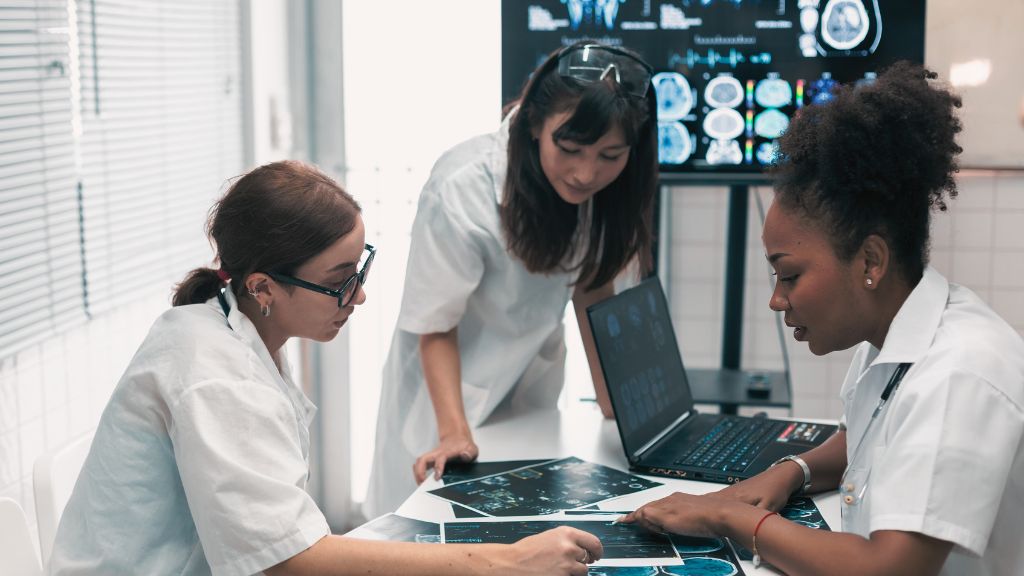Many students dream of joining the medical field but get worried about the NEET (National Eligibility cum Entrance Test) exam. It’s a tough exam, and not everyone wants to go through that stress. The good news is that you can still have a fulfilling and successful career in the medical field without taking NEET. There are plenty of other courses that can lead to great job opportunities.
Let’s explore what are the best courses in medical field without neet!
What Are the Best Courses in Medical Field Without Neet
1. B.Sc. Nursing
Nursing is a wonderful career choice if you love taking care of people. Nurses are always in demand, and they play a crucial role in the healthcare system. To become a nurse, you can opt for a Bachelor of Science in Nursing (B.Sc. Nursing). This is a four-year degree program where you will learn about anatomy, physiology, patient care, and much more.
Why Choose B.Sc. Nursing?
- High demand for nurses worldwide
- Opportunities to work in hospitals, clinics, schools, and more
- Possibility to specialize in areas like pediatric nursing, critical care, and oncology
Also read: How Long Does It Take to Become an Elementary School Teacher
2. Bachelor of Pharmacy (B.Pharm)
Pharmacists are essential in the healthcare industry as they dispense medications and advise patients on their proper use. A Bachelor of Pharmacy (B.Pharm) is a four-year undergraduate degree. During this course, you will learn about medicines, how they are made, and how they work in the body.
Why Choose B.Pharm?
- Growing pharmaceutical industry
- Opportunities in hospitals, retail pharmacies, research, and drug manufacturing
- Potential to open your own pharmacy
3. B.Sc. in Medical Laboratory Technology (MLT)
Medical Laboratory Technologists play a very important role in diagnosing diseases. They perform tests on samples like blood, urine, and tissues to help doctors make accurate diagnoses. A B.Sc. in Medical Laboratory Technology is usually a three-year program.
Why Choose B.Sc. MLT?
- High demand for skilled lab technologists
- Opportunities in hospitals, diagnostic labs, and research facilities
- Important part in the diagnosis and treatment of diseases
4. B.Sc. in Radiology and Imaging Technology
Radiology and Imaging Technologists use imaging equipment like X-rays, CT scans, and MRIs to help diagnose medical conditions. A B.Sc. in Radiology and Imaging Technology is typically a three-year course where you will learn how to operate these machines and interpret the images they produce.
Why Choose B.Sc. Radiology?
- High demand for imaging technologists
- Work in hospitals, diagnostic centers, and clinics
- Integral part of the diagnostic team
5. Bachelor of Physiotherapy (BPT)
Physiotherapists help patients recover from illnesses and injuries and by using exercises and other techniques to enhance movement and reduce pain. A Bachelor of Physiotherapy (BPT) is a four-year degree course that includes both theoretical and practical training.
Why Choose BPT?
- Growing awareness of physical therapy benefits
- Opportunities in hospitals, clinics, sports facilities, and rehabilitation centers
- Ability to help people improve their quality of life
6. B.Sc. in Optometry
Optometrists are eye care professionals who examine eyes, prescribe glasses or contact lenses, and detect eye diseases. A B.Sc. in Optometry is a four-year degree course where you will learn about the structure of the eye, vision testing, and eye care techniques.
Why Choose B.Sc. Optometry?
- Increasing demand for eye care professionals
- Opportunities in eye hospitals, clinics, and optical shops
- Ability to open your own optometry practice
Also read: List Five Non-college Options Available for Postsecondary Education
7. B.Sc. in Nutrition and Dietetics
Nutritionists and dietitians advise people on healthy eating habits to promote overall health and manage diseases. A B.Sc. in Nutrition and Dietetics is a three-year course where you will study food science, nutrition, and diet planning.
Why Choose B.Sc. Nutrition and Dietetics?
- Growing awareness of health and wellness
- Opportunities in hospitals, wellness centers, sports organizations, and private practice
- Ability to help people lead healthier lives
8. B.Sc. in Occupational Therapy
Occupational therapists help people of all ages engage in everyday activities using therapeutic techniques. This could be helping children with disabilities to participate fully in school, helping injured workers to regain skills, or providing support for older adults experiencing physical and cognitive changes. A B.Sc. in Occupational Therapy is a four-year degree.
Why Choose B.Sc. Occupational Therapy?
- Opportunities to work in diverse settings such as schools, hospitals, and rehabilitation centers
- Growing demand for occupational therapists
- The ability to make a significant impact on people’s lives.
9. Bachelor of Audiology and Speech-Language Pathology (BASLP)
Audiologists and speech-language pathologists help people with hearing and speech problems. A BASLP degree usually takes four years to complete and covers subjects like audiology, speech disorders, and hearing aids.
Why Choose BASLP?
- High demand for professionals in this field
- Opportunities to work in hospitals, clinics, and special education centers
- The ability to help people improve their communication skills.
10. Diploma in Medical Transcription
Medical transcriptionists listen to doctors’ voice recordings and turn them into written reports. A diploma in medical transcription can usually be completed in six months to a year. This job requires good listening and typing skills.
Why Choose Medical Transcription?
- Ability to work from home
- Opportunities in hospitals, clinics, and transcription services
- Important role in maintaining medical records
11. Diploma in Medical Imaging Technology
A diploma in medical imaging technology can be completed in two years. It prepares students to work with imaging equipment such as X-rays, CT scans, and MRIs. This course is perfect for those who are interested in radiology but do not want to commit to a full degree.
Why Choose a Diploma in Medical Imaging Technology?
- Shorter course duration
- High demand for imaging technologists
- Opportunities in hospitals and diagnostic centers
12. Diploma in Operation Theatre Technology
This two-year diploma course trains students to assist in surgical operations. Students learn how to prepare the operation theatre, sterilize equipment, and assist during surgeries.
Why Choose Diploma in Operation Theatre Technology?
- High demand for trained operation theatre assistants
- Opportunities in hospitals and surgical centers
- Important role in the surgical team
Also read: Four Relevance of Citizenship Education
Conclusion
The medical field offers numerous opportunities beyond the NEET exam. These courses provide excellent career prospects, job stability, and the satisfaction of helping others. Whether you are interested in nursing, pharmacy, lab technology, or any other medical field, there is a path for you that does not require NEET. Explore these options and choose the one that best aligns with your interests and goals. Remember, a fulfilling career in healthcare is possible without NEET!




